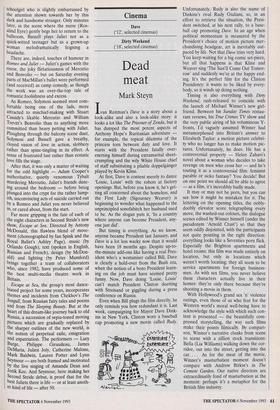Cinema
Dave ('12', selected cinemas) Dirty Weekend ('18', selected cinemas)
Dead meat
Mark Steyn
Ivan Reitman's Dave is a story about a look-alike and also a look-alike story: it looks a lot like The Prisoner of Zenda, but it has dumped the most potent aspects of Anthony Hope's Ruritanian adventure — for example, the topical dilemma of the princess torn between duty and love. It starts with the President fatally over- exerting himself during extramarital sheet- crumpling and the wily White House chief of staff substituting a pliable doppelganger played by Kevin Kline.
At first, Dave is content merely to dance 'Louie, Louie' with the robots at factory openings. But, before you know it, he's get- ting all concerned about the homeless, and the First Lady (Sigourney Weaver) is beginning to wonder what happened to the unprincipled sonofabitch her husband used to be. As the slogan puts it, 'In a country where anyone can become President, any- one just did'.
But timing is everything. As we know, anyone became President last January, and Dave is a lot less wacky now than it would have been 18 months ago. Despite up-to- the-minute add-ons like having a real Pres- ident who's a womaniser called Bill, Dave is clearly a hold-over from the Bush era, when the notion of a bozo President learn- ing on the job must have seemed pretty funny. Now, Dave doing 'Louie, Louie' can't match President Clinton duetting with Streisand or giggling during a press conference on Russia.
Even when Bill plugs the film directly, he only reminds you how redundant it is. Last week, campaigning for Mayor Dave Dink- ins in New York, Clinton wore a baseball cap promoting a new movie called Rudy. Unfortunately, Rudy is also the name of Dinkins's rival Rudy Giuliani, so, in an effort to retrieve the situation, the Presi- dent switched, at his next rally, to a base- ball cap promoting Dave. In an age when political momentum is measured by the President's choice of motion picture mer- chandising headgear, art is inevitably out- paced by life. Not that Dave tries very hard. You keep waiting for a big comic set-piece, but all that happens is that Kline and Weaver sing 'The Sun'll Come Out Tomor- row' and suddenly we're at the happy end- ing. It's the perfect film for the Clinton Presidency: it wants to be liked by every- body, so it winds up doing nothing.
Timing is also everything with Dirty Weekend, rush-released to coincide with the launch of Michael Winner's new girl- friend. Between his Sunday Times restau- rant reviews, his True Crimes TV show and the very public airing of his voluminous Y- fronts, I'd vaguely assumed Winner had metamorphosed into Britain's answer to Elizabeth Taylor: a motion picture celebri- ty who no longer has to make motion pic- tures. Unfortunately, he does. He has a controversial property — Helen Zahavi's novel about a woman who decides to take revenge on men who cross her — and he's touting it as a controversial film: feminist parable or sicko fantasy? You decide! But on one point we should all be able to agree — as a film, it's incredibly badly made.
It may or may not be porn, but you can see how it might be mistaken for it. The lettering on the opening titles, the oobly- doobly elevator score telegraphing every move, the washed-out colours, the dialogue scenes edited by Winner himself (under the pseudonym 'Arnold Crust') so that they seem oddly disjointed, with the participants not quite pointing in the right direction: everything looks like a Seventies porn flick. Especially the Brighton apartments and hotel rooms: this film was made entirely on location, but only in locations which weren't worth locating; they all seem to be service apartments for foreign business- men. As with sex films, you never believe these characters actually live in their homes: they're only there because they're shooting a movie in them.
With Hollywood's grand sex 'n' violence outings, even those of us who fear for the Western world's moral well-being have to acknowledge the style with which such con- tent is presented — the beautifully com- pressed storytelling, the way such films make their points filmically. By compari- son, Winner's narrative clunks from scene to scene with a zillion stock transitions: Bella (Lia Williams) walking down the cor- ridor, out into the street, getting into the car. . . . As for the meat of the movie, Winner's masturbation moment doesn't compare with Andrew Birkin's in The Cement Garden. Our native directors are extraordinarily fond of masturbation at the moment: perhaps it's a metaphor for the British film industry.










































































 Previous page
Previous page